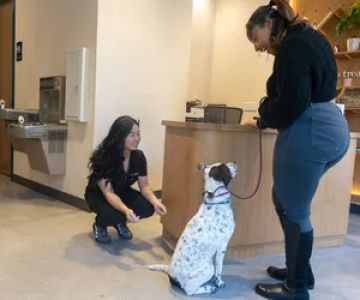How to Become an Associate Veterinarian
If you've always dreamed of working with animals and making a difference in their lives, becoming an associate veterinarian might be the perfect career for you. As an associate veterinarian, you will be working closely with animals, diagnosing and treating illnesses, performing surgeries, and helping to improve the health and well-being of pets, livestock, and other animals. But how do you start your journey to becoming a veterinarian, especially with the increasing demand for skilled veterinary professionals? In this article, we will walk through the steps you need to take, from education to experience, to become an associate veterinarian.
1. What Does an Associate Veterinarian Do?
Before diving into how to become an associate veterinarian, it's important to understand what the role entails. An associate veterinarian works in a veterinary clinic or hospital, providing medical care to animals. This includes conducting physical exams, diagnosing illnesses, administering treatments, performing surgeries, and offering advice on preventive care. Most associate veterinarians work as part of a team, collaborating with other veterinary professionals such as technicians and specialists.
Some of the key responsibilities of an associate veterinarian include:
- Diagnosis and treatment: Identifying animal diseases, infections, and injuries and prescribing medications or treatments.
- Surgery: Performing routine and emergency surgeries, such as spaying, neutering, or wound repair.
- Prevention: Advising pet owners on vaccinations, parasite control, and other preventive care measures.
- Client education: Explaining health conditions and treatments to pet owners and offering guidance on long-term care.
2. Educational Requirements: Veterinary Degree
To become an associate veterinarian, you first need to complete a veterinary degree. This involves attending a veterinary school accredited by the American Veterinary Medical Association (AVMA). Here’s a breakdown of the educational path:
- Step 1: Obtain a Bachelor’s Degree – Before applying to veterinary school, most applicants will need to complete a four-year bachelor’s degree in a related field such as biology, chemistry, or animal science. Some veterinary schools may have specific prerequisite courses you must complete, so be sure to check with the programs you're interested in.
- Step 2: Apply to Veterinary School – Admission to veterinary school is highly competitive. You will need to demonstrate academic excellence, volunteer or work experience with animals, and strong letters of recommendation. Most veterinary programs take four years to complete.
- Step 3: Complete Veterinary School – Veterinary school consists of classroom instruction and hands-on clinical training. You’ll learn everything from animal anatomy and physiology to surgery and diagnostics. After completing veterinary school, you will earn a Doctor of Veterinary Medicine (DVM) or Veterinary Medical Doctor (VMD) degree.
3. Licensing and Certification
After completing veterinary school, you must pass a licensing exam to practice as a veterinarian. In the United States, this exam is the North American Veterinary Licensing Exam (NAVLE). It tests your knowledge in areas such as pharmacology, diagnostics, and surgery. In addition to the NAVLE, each state may have additional requirements, such as a state-specific exam or continuing education requirements.
Once you pass the exam, you can obtain a license to practice as a veterinarian in the state where you intend to work. Some veterinarians may choose to pursue certifications in specialty areas such as surgery, dentistry, or emergency care, but this is optional and not required for most associate veterinarian positions.
4. Gain Experience Through Internships and Residencies
While veterinary school provides a solid foundation of knowledge, hands-on experience is crucial to becoming a competent associate veterinarian. Internships and residencies provide invaluable opportunities to work alongside experienced veterinarians in a clinical setting. Many veterinary students choose to complete an internship immediately after graduation to gain practical experience in diagnosing and treating animals. This is particularly important for those who want to specialize in a specific field, such as oncology or orthopedics.
Internships typically last one year, while residencies can take up to three years. During these programs, you will be mentored by specialists and have the opportunity to perform complex surgeries and diagnostics. Not all associate veterinarians choose to do internships, but it can significantly improve your skills and marketability in the job market.
5. Build Strong Relationships with Clients and Colleagues
Being an associate veterinarian requires more than just technical skills; it also requires excellent communication and people skills. You will need to build strong relationships with pet owners, other veterinary staff, and sometimes even other veterinary professionals if you refer patients to specialists.
As a veterinarian, you must be able to explain medical conditions, treatment options, and care plans in a way that is clear and understandable. Empathy and compassion are also essential when dealing with sick or injured animals, and you will often be the one to deliver difficult news to pet owners. Building a trusting relationship with your clients is key to providing the best care and ensuring they continue to seek your services for their pets.
6. Job Outlook and Career Advancement
The demand for veterinarians in the United States is growing, especially in urban areas where pet ownership is increasing. According to the U.S. Bureau of Labor Statistics, employment of veterinarians is projected to grow 16% from 2019 to 2029, which is much faster than the average for other occupations. This means that opportunities for associate veterinarians are plentiful, and there is significant potential for career advancement.
As an associate veterinarian, you may choose to advance in your career by pursuing a specialty or opening your own practice. Many veterinarians choose to specialize in areas such as animal surgery, dermatology, cardiology, or emergency care. With additional training and certification, you can become a board-certified specialist in your field, opening doors to new job opportunities and higher salaries.
7. The Rewarding Path to Becoming an Associate Veterinarian
Becoming an associate veterinarian is a challenging yet incredibly rewarding career choice. It requires years of education, hands-on experience, and a passion for animal welfare. If you are dedicated to learning, compassionate, and driven to make a difference in the lives of animals and their owners, this career may be the perfect fit for you.
While the journey to becoming an associate veterinarian may be long, the satisfaction of helping animals live healthier and happier lives makes the effort worthwhile. If you're ready to take the next steps toward becoming a veterinarian, consider the educational and practical requirements outlined above, and start your journey today!
OLD Keywords-31: SEO Title: How to Become an Associate Veterinarian SEO Keywords: associate veterinarian, how to become a veterinarian, veterinary career, veterinarian education, veterinary school, DVM SEO Description: Learn the step-by-step process of how to become an associate veterinarian, including educational requirements, licensing, and career opportunities in the field of veterinary medicine.










